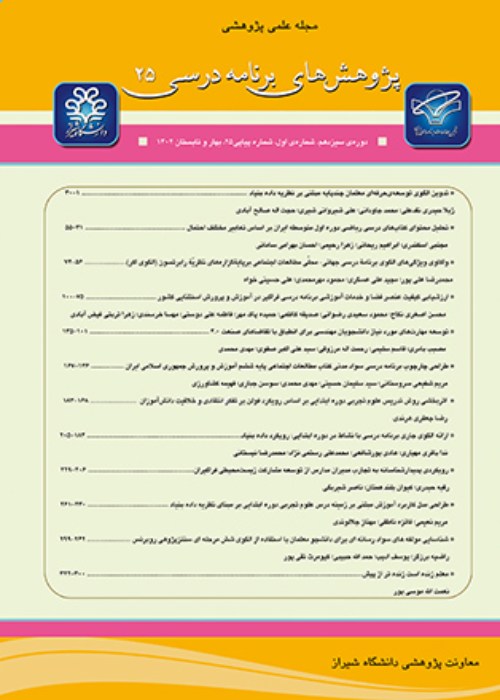A Conceptual Model of Elementary Teacher Professional Development Using a Future Studies Approach
The future is the age of networks, but not technology networks, rather human networks and the age of human intelligence in global networks. In this regard, the role of teachers, as the core players in the education system, their professional development will be increasingly important. The present study aimed to design a model for the professional development of elementary teachers using a future research approach. Research questions What are the key elements of a conceptual model of professional development with a future studies approach?
This applied research used a theoretical framework to identify the concepts that underlie the basic nature and structure of elementary teacher professional development. In addition, the relationships between the identified concepts were examined. In fact, the study method had two dimensions, namely, experimental and philosophical. The empirical dimension of the theoretical framework required an understanding of the real world of the curriculum, which can be achieved through scientific, ethnographic, phenomenological, or other appropriate types of research. The philosophical dimension required detailed knowledge of concepts and theoretical processes involved in the phenomenon under study (Short, 2015). In this study, the researchers utilized a future research approach to develop a model for the professional development of elementary teachers. For this purpose, a field study was conducted using the existing literature and surveys. The research tool was a semi-structured interview. The participants were selected through a purposeful (criterion-based) sampling technique, and the inclusion criteria included the followings: at least 25 years of experience in teaching and a master’s or doctoral degree. Sampling continued up until theoretical saturation was reached. The study sample included 10 elementary teachers, 3 principals, and 2 human resource training experts working in Sarayan Education Department, Sarayan, South Khorasan Province, Iran. The criteria suggested by Lincoln and Cuba (1980) were used to ensure validity and reliability. To assess the transferability of the findings, experts’ opinions were consulted. The reliability of the findings was evaluated by measuring the level of agreement between coders, and peer debriefing was used to assess the validity of the findings.
Based on the findings, the conceptual model of professional development for elementary teachers comprised four elements, namely, religious, cultural and social, political, and economic knowledge. Given the potential weakening of the position of religion in the future and challenges facing this element, religious knowledge was decided to be the basis and axis of professional development in future professional development programs for teachers. According to the findings, teachers’ professional ethics has not received enough attention. Also, cultural and social factors, as one of the four main elements of the model of teacher professional development, should be given due attention because in the future, due to globalization and increasing cultural diversity, future educational environments will be at the heart of cultural exchanges between different countries. Thus, it is necessary to prepare educational stakeholders, especially teachers, for a globalized world in the future. Given that teachers’ voices are not adequately reflected in education policies, effective political strategies and policies, such as decentralization, should be included in future teacher professional development programs. Due to the declining income of families, economic fundamentals should be included in the teacher professional development programs in the future. In addition, the developed model had two dimensions: internal and external. The former included the individual aspect, skills, and content, and the latter entailed technology, organization, and communication. Based on the obtained results, three scenarios, including the desired type, the existing type, and the critical type, can be explained by the model. Finally, it is suggested that teacher professional development programs in the future try to improve teachers’ knowledge and metacognitive and critical skills and foster the development of social status in society, political literacy, participation in virtual and non-virtual content production, national and global identity, professional ethics. Also, such programs need to attract financial and public support and promote technology infrastructure development and specialization in the field of technology.
With regard to technology, it is suggested that low-income schools be provided with basic technology infrastructure, interactive software, and cyberspace on a secure platform. It is equally important that teachers be offered continuous educational courses in applied technology and its integration with education. The current trend of teacher burnout and teacher shortage and the possible continuation of this trend in the future make it necessary that future student enrollment in Farhangian University be decided based on students’ skills and competence. Since some teachers lack the skills required during the process of teaching, it is suggested that future teacher professional development programs provide teachers with study opportunities as well as specialized courses focused on cooperation with the scientific community. These measures are hoped to remove barriers to continued education for teachers. Due to the limited involvement of teachers in different educational decision-making processes, it is suggested that teachers be involved in curriculum design and textbook development. By the same token, it is highly advisable that the macro and micro educational policies be formulated with the help and collaboration of teachers.
- حق عضویت دریافتی صرف حمایت از نشریات عضو و نگهداری، تکمیل و توسعه مگیران میشود.
- پرداخت حق اشتراک و دانلود مقالات اجازه بازنشر آن در سایر رسانههای چاپی و دیجیتال را به کاربر نمیدهد.



